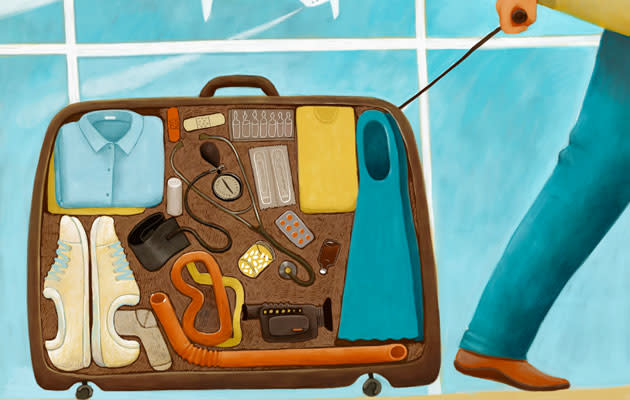 Fit to Post Health
Fit to Post HealthTop 8 travel health questions to ask before your trip

From food-borne illnesses to infectious diseases, travelling abroad can pose certain risks to your health. That's not to say you should stay home.
"Everyone should go and travelling. There are lots to see and learn from other cultures. However, you should always go prepared," says Dr Limin Wijaya, Consultant at Singapore General Hospital's Travel Clinic.
As a rule of thumb, ask yourself the eight following questions in the early stages of your travel planning.
1. When should I see a doctor before my trip?
You should visit a doctor four to six weeks before your departure date. "It is important to plan in advance as certain vaccinations require double or triple doses spread over a month to become effective," explains Dr Wijaya.
In addition, consulting early allows for contingency planning or a change in itinerary if required.
2. Have I done research on the destination to find out the potential health hazards?
Some developing countries are riskier than others and may require more medications or vaccinations to prevent health problems. The same country can represent different risks depending on the season. For instance, the risk of mosquito-borne illnesses increases during the monsoon.
Dr Wijaya suggests: "You can look up websites like Centres for Disease Control and Prevention and World Health Organization to get reports of disease outbreaks and up-to-date information about health-related issues."
At the same time, you should research where you could get medical help at your destination should the need arise.
Related article: How to adapt to cold conditions or extreme heat during your next holidays
3. What activities will I be engaging in?
A rugged, outdoors-bound backpacker will not face the same risks as a business traveller. Discuss your proposed trip activities with your doctor. Dr Wijaya explains: "For instance, if you have a pre-existing heart problem and are intending to trek in Tibet, you should check whether travelling at a high altitude is advisable for you."
4. Have I got my vaccinations?
If you are travelling to developing countries like India or South America, you will probably need standard vaccines against hepatitis A, hepatitis B and typhoid.
Always keep a record of your vaccinations in case you need to show proof at your destination. For instance, certification of yellow fever vaccination is required by some countries in Africa and South America.
In malaria-endemic locales, anti-malarial pills are a must.
Related article: Could a simple Hep B vaccine potentially save you from liver cancer?
5. Have I packed all the medications that I need for my pre-existing health condition (if any)?
If you have a pre-existing condition like diabetes or heart disease, ask your doctor for sufficient medications to pack for your trip. Dr Wijaya adds: "If possible, bring more than enough medications to buffer for any unexpected delays. Also bring an extra prescription for refills, as well as a written list of your medications, including both the trade name (such as Prandin) and actual name (like repaglinide) of each medication."
If you need to pack syringes and needles, bring along a doctor's letter.
6. Have I prepared a first aid kit?
Pack a suitable first aid kit before you set off. "A travel health kit should be tailored to your personal needs, type of travel, length of travel and destination," explains Dr Wijaya.
Basics include essentials like anti-diarrhoea pills, plasters, antiseptic cream, sunscreen and mosquito repellent.
Travelling to a rural area which is far from a health care facility? Do pack bandages and splints too.
Related article: How to protect yourself from travellers' diarrhoea?
7. Have I unwittingly packed medications that are illegal in certain countries?
The list of illicit drugs can be broader than you think. "This includes opioids, such as codeine-based medications or some cough mixtures," explains Dr Wijaya. "If the medications are part of a prescription, get a doctor's letter as proof."
All prescriptive drugs should also be kept in their original container, with the original labels detailing your name and the doctor's name.
8. Have I bought travel insurance?
Even if you are well prepared and travel with caution, illness or injury can occur, no matter the length of the trip. That's when travel insurance comes in handy.
"A good travel insurance company will be able to assist in case of an accident or sudden illness overseas," explains Dr Wijaya. Should you need to return urgently to Singapore for treatment, a good insurance can help with the repatriation cost.
Make sure that the travel insurance policy provides medical assistance by phone, 24 hours, seven days a week.
SGH Travel Clinic is run by specialists from the Department of Infectious Diseases. It is a designated Yellow Fever Centre. The team of doctors and nurses will offer comprehensive travel advice and country-specific recommendations prior to your trip.
This article was written by Jaclyn Lim for Health Xchange, with expert input from the Travel Clinic at Singapore General Hospital (SGH).
Find more health-related tips and articles on HealthXchange.com.sg, Singapore's trusted health and lifestyle portal.
Health Xchange's articles are meant for informational purposes only and cannot replace professional surgical, medical or health advise, examination, diagnosis, or treatment.


